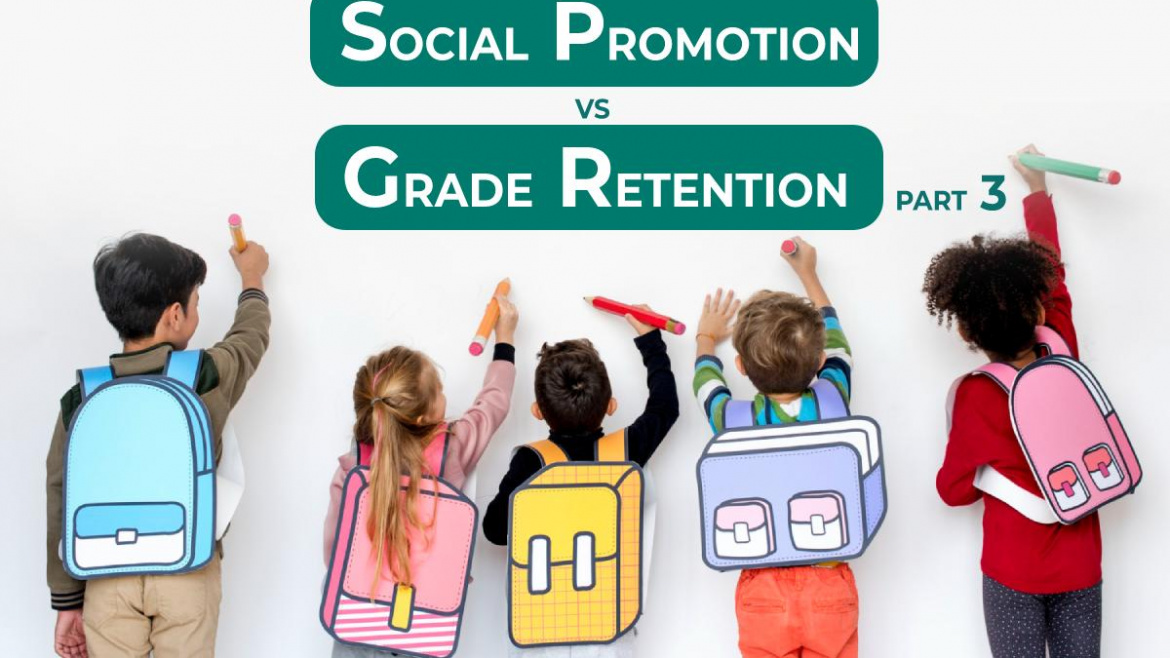Grade Retention is the practice of requiring low-performing students to repeat the same grade in order to master what has not been learned. Often, educators recommend grade retention because of a child’s severe academic underachievement. It is also sometimes proposed when a child has been absent from school for a prolonged period because of illness.
Retention is a complex and emotionally laden issue as it is the most common and immediate consequence for students who have not mastered grade level material. Many students do not see retention as a positive event designed to help them learn better nor do schools portray retention as a positive event. Parents, educators, and students view retention as a punishment and a stigma. Also, educators consistently underplay the extent of conflict with parents over the decision to retain and underestimate the degree of parents’ active resistance or passive but unhappy compliance. Research shows that first graders are retained more often. From second through sixth grade, retention rate decreases. They increase again in the seventh grade and at the high school level.
Is grade retention really beneficial? Educators think so but research and expert opinion does not concur.
Given the increasing popularity, one seems to think grade retention is a pedagogical technique. No doubt, educators see grade retention as beneficial even when it is portrayed as a punishment. Literature review suggests that educators view the following benefits for the student: assumes leadership, becomes more comfortable with the school routine, being more cooperative, greater self-confidence, more academic success, greater involvement in the social group within the school, and more positive attitude towards school. Many view retention as a necessary measure to ensure that students are well prepared with basic knowledge and skills for use in future. Retention is seen as appropriate in lower grades – particularly the younger children in class and those who are less “mature” emotionally. An ever- increasing number of kindergarten teachers recommend retention based on their beliefs about the child’s maturational level. Most of these teachers believe that, as the child repeats the grade, they become more prepared to learn in school according to an evolutionary, physiological unfolding of abilities. Another cited reason for retention is fear of criticism from teachers in the next grade for promoting a student who is not well prepared. Teachers also report that groups of retained students show a “bounce” in their academic performance. But what does research and expert opinion say about grade retention? A vast majority of studies conducted over the last century documents the ineffectiveness and failure of grade retention as an intervention or solution for students who are already struggling to learn in school. They point to the fact that these students remain behind academically in the long-term. And in most instances, retention has nothing to address the problems of students who find it difficult to learn. Children do not improve academically in a straight linear progression from year to year. They learn in spurts. A child might achieve six months academic growth one year and significantly more the next. Then, why penalize a child for one poor year when that child might progress satisfactorily in later grades? Also, especially those children with Special Needs, may never learn certain concepts or skills like extracting a square root without a calculator but live without that skill – maybe even make more money than an educator does!
Most students who are retained have behavioural difficulties, learning disorders, short-attention span, developmental delay, and poor social skills. Students with these problems have a higher dropout rate than students without disabilities. Moreover, students with behavioural or emotional difficulties have the highest dropout rate than students with any other disability. And contrary to what educators think, retention does not help these students move up academically. Retention has a negative effect on academic achievement, classroom behaviour, attitude toward school, and school attendance. It also reduces self- esteem, and these students may give up on themselves as learners. The advantage of temporary, short-term “bounce” is known to decrease over time. Repeating a grade has been linked with an increased risk of dropping out of school. Possible explanations include: retention is the strongest message an educator or school can give a student that they are not as capable as their peers; retention does not benefit as a remedial strategy as it does not improve school performance; and over-aged students are uncomfortable and become more frustrated when they struggle with academic work. For the individual student who drops out, negative outcomes include low income and lifetime earnings, high unemployment rates, involvement in crime, and limited cognitive growth. These costs are even more pronounced for students with disabilities.
Studies show that grade retention in kindergarten does not help as there is no conclusive evidence that show any boost or academic advantage from the extra year to mature in kindergarten. Instead, what retention in kindergarten does is to change the composition of classes at kindergarten and grade one level – kindergarten classes may have more and more of “less mature” students who are pulled out of their age group and retained while first grade classes would include more and more of older and “more mature” students. As noted by the Head of a well-known kindergarten in India, this encourages another undesired consequence – escalation of the curriculum. Escalating curriculum is encouraged when educators at first grade level increase the level of difficulty of what is being taught with the result that skills and concepts that need to be taught to students at grade two are now considered more appropriate to be included in first grade.
To be continued.
READ OUR PREVIOUS BLOG ON SOCIAL PROMOTION VS GRADE RETENTION : https://seedse.ae/social-promotion-vs-grade-retention-part-2/

